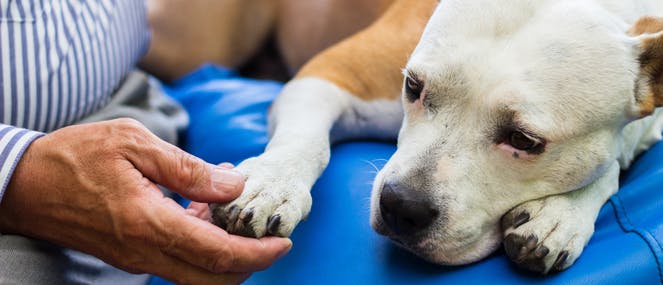
- A Guide To Perfect Your Pet's Health/
- Health and Vitality Products For Your Dog/
- How often should your dog see a vet?


How often should your dog see a vet?
If your dog gets a healthy diet, regular exercise, and plenty of love and care, an annual check-up may be all you need for your canine companion.
Or perhaps you are managing a chronic condition in your dog, such as dog arthritis, or pancreatitis in dogs, and need more help.
While much of the work we do to ensure our pet’s health is reinforced at home, based on their individual wellness plan, a veterinary team is also essential.
Like humans, dogs benefit from regular check-ups, and catching problems such as dog skin conditions or dog arthritis early can save you money in the long-term.
In an emergency, you’ll also want to know there is a medical professional you can call on for help.
How often you take your dog to the vet also depends on their age as well as their general health.
When you get a puppy
When your dog is a puppy, they are likely to be at the vet more often for vaccinations and check-ups.
It is recommended that your dog has a vaccination for distemper, hepatitis, and parvovirus at six to eight weeks old, then again at 10 to 12 weeks, and 12 to 16 weeks.
This is the time you may also need more advice about preventative care, for example diet, exercise and how to reduce the chance of your dog developing diseases such as dog arthritis, or diabetes, to set your dog up for a healthy and happy life.
Your vet team will also make sure your puppy is developing well.
Unless you intend breeding your dog, they will return to be desexed at around six months old.
When you have a young dog
“The minimum your pet should visit the vet is once a year,” says Dr Sarah Howard, Head Vet for PAW by Blackmores.
At this annual health check, the vet may give your dog a vaccination booster as well as an all-over check-up.
However, the Australian Veterinary Association advises that the vaccines used for your dog are determined by a range of factors including your dog’s health status, age and environmental risk.
The vet will also have a look at your dog’s eyes and ears, listen to their heart and lungs, assess joint health with a visual or manual examination, and ask and answer questions about your pet’s general health as well as your program for controlling flea and ticks and for preventing heartworm.
Your veterinary team, that can include a vet nurse or a vet technician, are also able to make suggestions about what to feed your dog, how to look after their teeth, how much exercise they need, and any products or supplements that may be beneficial to their health.
For example, grooming products such as PAW Nutriderm Replenishing Shampoo and Conditioner may be recommended to keep their coat silky and fresh, or PAW DigestiCareTM to improve gut health.
And what dog doesn’t love a bag of liver treats after a visit to the vet clinic.
When your dog is seven years or older
Just like older people, older dogs may have higher risks of illness or age-related injuries.
Seeing your vet every six months, for a check-up for your senior dog, makes good sense.
Any concerns can be investigated and any chronic conditions such as dog anxiety, dog arthritis, or pancreatitis in dogs can be treated and monitored.
PAW Fish Oil 500: Veterinary Strength for dog arthritis may also be recommended, while there are a range of natural supplements available for other conditions.
Says Dr Sarah: “Dogs age faster than humans so a lot can change in terms of their health in what feels to us like a short period of time.”
When your dog becomes suddenly ill, or has an accident
This is a situation in which you should seek help from your vet straight away, says Dr Sarah.
Signs your dog needs immediate attention include:
- Trouble breathing
- Vomiting or diarrhea that lasts longer than 24 hours
- Seizures
- If you dog has eaten something toxic like poisons or household cleaners
- Whining, shaking or refusing to socialise, that may be signs of extreme pain
- Inability to stand up, or shaky back legs
- Disorientation
- A swollen, hard abdomen
Remember, when in doubt, it’s always a good idea to seek professional help.
When you have an anxious dog
If you have an anxious dog, calming your dog before the vet visit is essential. A supplement that contains tryptophan, such as PAW Complete Calm may help, while using treats as rewards at the vet can enhance the experience.
Together, you and your vet can work together to make sure you have a comprehensive health and happiness plan for your dog.




